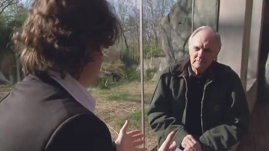Teachers' Domain - Digital Media for the Classroom and Professional Development
User: Preview

Source: The Human Spark: "So Human, So Chimp"




Major funding for The Human Spark is provided by the National Science Foundation, and by the Alfred P. Sloan Foundation. Additional funding is provided by the John Templeton Foundation, the Cheryl and Philip Milstein Family, and The Winston Foundation.
Cooperation Over Competition Transcript
BRIAN HARE We don’t know each other that well, we’re strangers to each other. But we’re working together right know to try to explain this to people. And not only that but we are motivated to interact with one another in a way that these guys aren’t. For a chimpanzee who doesn’t… particularly for a male chimpanzee, who doesn’t know another male chimpanzee, for the two of them to get together, sit down and work together on a problem, it’s just about impossible.
ALAN ALDA (NARRATION) Even Frans de Waal, the foremost proponent of our continuity with chimps, acknowledges that this is one realm where we’re very different.
FRANS DE WAAL So humans actually have already a capacity to get along with their neighbors more than chimps do. But then in addition, in our modern society, that’s of course unprecedented what we do. If you were to put 10 million chimps in New York City, I don’t think you would have the same kind of city. There would be a bloodbath, basically.
ALAN ALDA (NARRATION) So here we seem close to a major split with chimpanzees. While we’ve seen that they can do many things once thought of as exclusively human – use tools, imitate, keep track of who’s done favors for whom – what we have that they don’t – what comes closest perhaps to being the Human Spark – is our ability to get along, even with people we don’t know. It’s something Mike Tomasello calls a sense of “we-ness,” of cooperation, collaboration, shared goals and intentions.
MICHAEL TOMASELLO If you look from the outside the things that make humans really different are things like complex technology, symbol systems like language and mathematics and social institutions like governments and religions. And the question is, what does it take to participate in these things? And what it takes to participate in these cultural products is being able to put your head together with others and to communicate with others, cooperate with others and exchange information with others in a cultural group.
 Loading Standards
Loading Standards